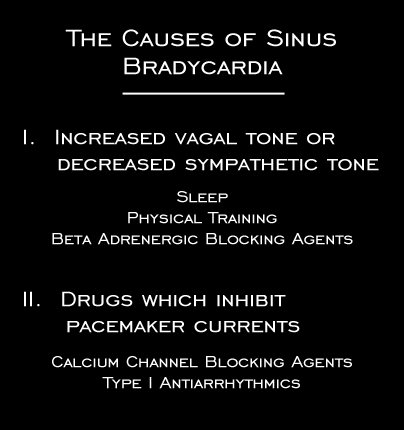
Sinus bradycardia is defined as a decrease in sinus rate to less than 60 beats per minute (bpm), although some use 55 bpm as the cut-off. Sinus bradycardia is usually caused by an increase in parasympathetic or vagal “tone" and/or a decrease in sympathetic “tone”. This is the mechanism responsible for the sinus bradycardias that occur during sleep and with physical conditioning. It is also the mechanism underlying the effect of the beta adrenergic blocking agents. Sinus bradycardia may also be caused by drugs that directly inhibit pacemaker currents, such as the calcium channel blocking agents and the class 1 antiarrhythmic agents.
